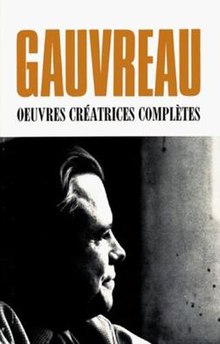Claude Gauvreau
| Claude Gauvreau | |
|---|---|
 |
|
| Born |
19 August 1925 Montreal |
| Died | 7 July 1971 |
| Nationality | Canadian |
| Known for | Literature (Poetry, Drama, Prose, Essays), Painting |
| Movement | Automatist |
Claude Gauvreau (August 19, 1925 – July 7, 1971 in Montreal, Quebec) was a Canadian playwright, poet, sound poet and polemicist. He was a member of the radical Automatist movement and a contributor to the revolutionary Refus Global Manifesto.
Gauvreau pursued classical studies at the Collège Sainte-Marie, and graduated with a B.A in Philosophy from Université de Montréal.
He discovered modern art through his brother Pierre, who attended l'École des beaux-arts, and met painter Paul-Émile Borduas, leader of Les Automatistes. He then became an unconditional advocate of the Automatist Movement of the Montreal Surrealists, and, in 1948 contributed to the Refus Global ("Total Refusal") Manifesto, which would become a key document of Quebec and Canadian cultural history.
Between 1944 and 1947, he wrote Les Entrailles, a collection of 26 short plays or "dramatic objects". In 1947, he staged one of these plays, Bien-être, with his muse, actress Muriel Guilbault.
Following Muriel Guilbault's suicide in 1952, Gauvreau's fragile emotional stability caused him to be institutionalized ten times over eight years in Montreal psychiatric hospital Saint-Jean-de-Dieu. He continued to write, though. While working for the radio, between 1952 and 1969, he wrote several of his best known works, beginning with Beauté baroque (1952), a novel depicting the life of Muriel, as well as several collections of poems, including Sur fil métamorphose (1956), Brochuges (1956), and Étal Mixte (1968). In 1958, two of Gauvreau's short plays were performed at École des beaux-arts: La jeune fille et la lune and Les grappes lucides.
In 1956, at a time he believed he would die, Gauvreau wrote what many consider to be his masterpiece, La charge de l'orignal épormyable (The Charge of the Expormidable Moose). Set in a vaguely institutional communal home, the play revolves around Mycroft Mixeudeim, a poet who is envied, plagiarized, mocked and ultimately sacrificed by his fellow housemates. When the play finally premiered in 1970 at Le Gésu in Montreal, the production closed after only a few performances as a result of poor planning and sheer lack of audience. But three years after Gauvreau's death, in 1974, the play received a successful production at Théâtre du Nouveau Monde, and went on to receive several more productions over time in Quebec, as well as a television adaptation for Radio-Canada Television in 1992.
...
Wikipedia
